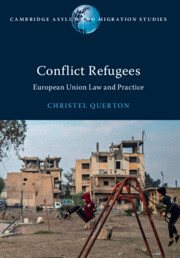Book contents
- Conflict Refugees
- Cambridge Asylum and Migration Studies
- Conflict Refugees
- Copyright page
- Contents
- Tables
- Series Editor’s Preface
- Acknowledgements
- Table of Cases
- Table of Treaties and Other International and Regional Instruments
- Abbreviations
- 1 Introduction
- 2 The Legal Framework
- 3 Contemporary Armed Conflicts, Violence and Gender in International Refugee Law
- 4 Judicial Constructions of Risk on Return to Situations of Contemporary Armed Conflict
- 5 Judicial Constructions of ‘Well-Founded Fear of Being Persecuted’ in Situations of Contemporary Armed Conflict
- 6 Judicial Constructions of the Refugee Convention Reasons for Persecution in Situations of Contemporary Armed Conflict
- 7 Conclusion
- Appendices
- Bibliography
- Index
5 - Judicial Constructions of ‘Well-Founded Fear of Being Persecuted’ in Situations of Contemporary Armed Conflict
Published online by Cambridge University Press: 20 July 2023
- Conflict Refugees
- Cambridge Asylum and Migration Studies
- Conflict Refugees
- Copyright page
- Contents
- Tables
- Series Editor’s Preface
- Acknowledgements
- Table of Cases
- Table of Treaties and Other International and Regional Instruments
- Abbreviations
- 1 Introduction
- 2 The Legal Framework
- 3 Contemporary Armed Conflicts, Violence and Gender in International Refugee Law
- 4 Judicial Constructions of Risk on Return to Situations of Contemporary Armed Conflict
- 5 Judicial Constructions of ‘Well-Founded Fear of Being Persecuted’ in Situations of Contemporary Armed Conflict
- 6 Judicial Constructions of the Refugee Convention Reasons for Persecution in Situations of Contemporary Armed Conflict
- 7 Conclusion
- Appendices
- Bibliography
- Index
Summary
Chapter 5 examines how an essential element of the Refugee Convention definition, namely the ‘well-founded fear of being persecuted’, is applied and interpreted by judicial authorities when appellants flee contemporary armed conflicts. It sets out that only appellants who had experienced past persecution or singling out had their claim examined under the Refugee Convention. The chapter also discusses the finding that although appellate authorities have some awareness of gender norms, these are considered fixed, such that any departure from them is disbelieved and results in a negative risk assessment. Appellate authorities in the EU thus apply a higher standard of proof than warranted in international refugee law. In effect, this has led to a modification of the standard of proof in international refugee law as it is now equated with the assessment of credibility, which itself can be highly gendered. The chapter claims that the practice acts as barrier to the international protection of persons fleeing contemporary armed conflicts. Further, the failure to examine the general conditions of violence in contemporary armed conflicts is contrary to the obligations of states under international law.
Keywords
- Type
- Chapter
- Information
- Conflict RefugeesEuropean Union Law and Practice, pp. 83 - 102Publisher: Cambridge University PressPrint publication year: 2023



